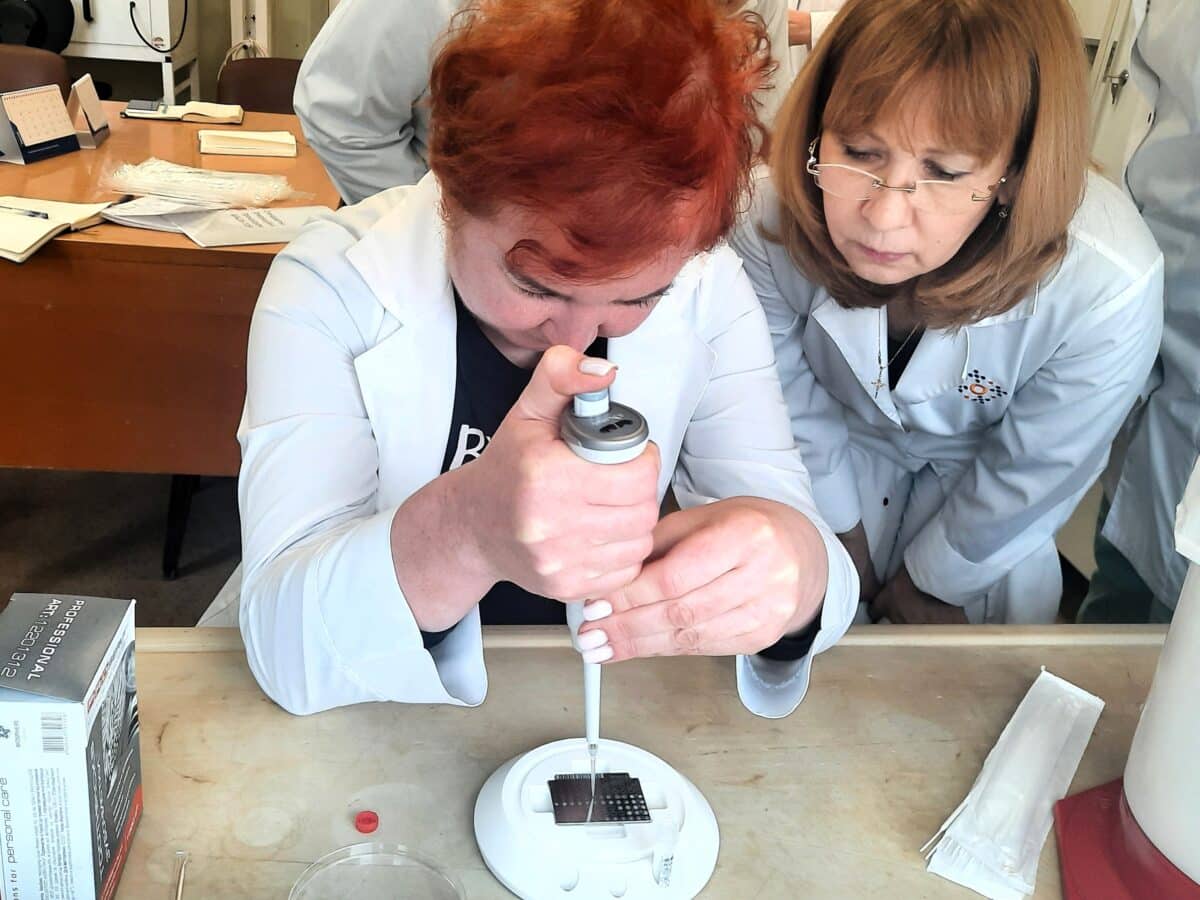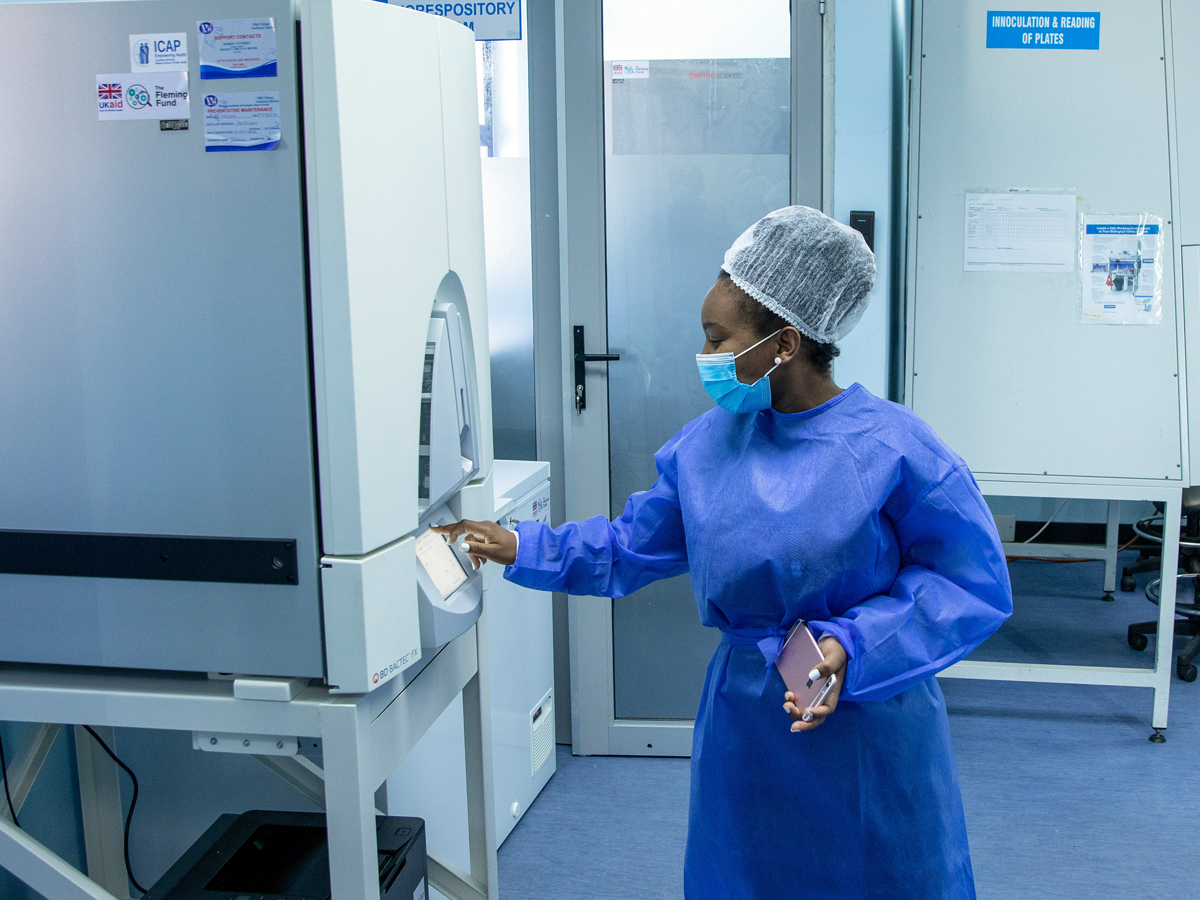After Russia’s invasion of Ukraine in February 2022, international public health experts knew the country and its neighbors would soon face an invisible crisis in addition to the destruction and mass casualties of war: the spread of antimicrobial resistance (AMR).
Globally, AMR causes more deaths than HIV or malaria, spurring the World Health Organization (WHO) to declare it one of the top 10 public health threats facing humanity. Though AMR can develop and spread through contact among humans, animals, and the environment, health care settings are a main driver of its transmission. War means a greater influx of wounded patients to health facilities and places increased stress on health systems and health providers, infection prevention and control practices, and antibiotic prescription practices. This can create an environment where multidrug resistant microbes can thrive and spread.
“These essentially untreatable or highly resistant organisms are putting Ukraine and the surrounding countries at risk,” said Sarah Legare, MPH, CPHQ, ICAP’s regional AMR advisor. “These organisms can live in the hospital environment so that other patients who are treated in those environments are at risk. They can be transferred from health care workers, and they can live in sink drains and on other surfaces and environments in the health care setting.”
Since 2022, ICAP has been working with support from the U.S. Centers for Disease Control and Prevention (CDC) to strengthen AMR surveillance, prevention, and treatment in three pilot hospitals in central Ukraine that have been tasked with receiving and treating soldier and civilian casualties caused by the war. The hospitals, in the regions of Vinnytsia, Ternopil, and Khmelnytskyi, are all large facilities that have bacteriology laboratories in the hospital. The project also supports three public health laboratories in Vinnytsia, Ternopil, and Khmelnytskyi and the national reference laboratory at the Ukrainian Public Health Center.
The selected hospitals “are dealing with the equivalent of a mass casualty event on a weekly basis because there are so many people getting injured,” Legare explained. “And so the infrastructure, staff, and systems that need to be in place to properly prevent and control transmission of resistant bacteria are just enormous.”
Even before 2022, Ukraine had higher-than-average rates of mortality attributed to AMR compared to most countries in the WHO European region. Once war broke out, regional public health officials from the CDC knew it would only get much worse, based on what had happened with AMR spread during recent wars involving U.S. servicemen.
“They understood the background, that during previous conflicts, specifically in Iraq and Afghanistan, there was well-documented transmission of highly resistant bacterial organisms,” Legare said. “The conflicts were exacerbating and acting as a catalyst for the development and spread of these organisms.”
A “signature” organism emerged because of the Iraq War, Acinetobacter baumannii, nicknamed “Iraqibacter.” A 2009 study found it accounted for 19 percent of ventilator-associated pneumonia cases in European intensive care units.
“Shortly after the war in Ukraine started, the European Centre for Disease Prevention and Control put out guidance to tell anyone in Europe who was treating a patient who had been hospitalized in Ukraine in the last year that they should screen and preemptively manage these patients as if they are either carrying or infected by resistant bacteria,” Legare said. “Since then, the Netherlands, Germany, the United Kingdom, and Spain have all reported cases of these types of highly resistant organisms that cause severe disease, sometimes the country’s first ever, connected to patients coming from Ukraine.”
In fact, a signature resistant pathogen has emerged for this war as well: Klebsiella pneumoniae.
The CDC successfully mobilized U.S. funding to support an emergency health response in Ukraine for several program areas, including AMR. It then gathered a group of stakeholders, including the WHO, the Ukraine Public Health Center, the Association of Public Health Laboratories, the European Society for Clinical Microbiology and Infectious Diseases, and ICAP, which is the main implementing partner. The U.S. Department of Defense is also providing subject matter expertise on military medicine and resistant infections in conflict settings.
ICAP is working in several ways to improve AMR response in the selected health facilities. For example, it assembled and is training multidisciplinary, in-house teams consisting of a physician, epidemiologist, an infection prevention and control representative, a bacteriologist, and a pharmacist. It has also procured state-of-the-art equipment to outfit the seven laboratories, including microbiological analyzers and microbial detection systems. Teams at each of the laboratories received training from the vendor and ICAP staff are providing ongoing support to integrate the new equipment into existing workflows. The equipment will improve the quality and quickness of analyzing and identifying resistant microbe samples sent in from patients.
With the information from those tests, the hospital can determine the best course of treatment for infected patients and group those with similar infections to prevent further spread.
A recent assessment of AMR testing capacity found that the six laboratories had improved since the start of the project by an average of 22 percent overall. The assessment includes indicators for quality, methods, and infrastructure.
“Thanks to CDC and ICAP assistance, our work is reaching a higher level,” said Natalia Krasii, a bacteriologist at Ternopil Regional Hospital. “Finally, we will be able to operate with state-of-the-art equipment.”
ICAP also hosts biweekly calls with the multidisciplinary teams to review challenging cases and provide training on a variety of topics. As part of these learning sessions, U.S. military doctors have shared their experiences with implementing infection control measures to prevent the spread of resistant organisms in field hospitals during prior combat operations.
For example, doctors at the U.S. Air Force Theater Hospital in Iraq demonstrated in a study during the Iraq War that by implementing infection prevention and control measures, they were able to substantially bring down the rate of ventilator-associated pneumonia, which is often caused by multidrug resistant bacteria, including the notorious Iraqibacter. They were so successful, in fact, that rates were less than those seen in trauma ICUs in the U.S., despite having had only one sink per medical tent, no access to isolation rooms, a high patient volume, and minimal space between beds.
“We’re hoping that the hospitals in Ukraine can apply a bundle of infection control interventions similar to what was adopted in Iraq to mitigate the spread of resistant organisms in their settings,” said Andrea Howard, MD, MS, director of ICAP’s Clinical and Laboratory Unit, who is leading ICAP’s work in Ukraine.
Going forward, the ICAP project is helping the hospitals implement colonization screening, which requires screening everyone who enters certain units in the building for resistant organisms, since not everyone carrying them will show symptoms. Additional laboratory equipment and consumables were delivered to Ukraine in January, including two MALDI-TOF mass spectrometry diagnostic systems, which use a laser to simultaneously identify up to 96 different samples of bacteria within a few minutes, a vast improvement over the 5 to 48 hours it normally takes using traditional methods. ICAP is also procuring MiSeq gene sequencing platforms, which are able to provide critical information about the resistant microbe on a genetic level and to track transmission.
The project is now preparing to expand to additional hospitals in Ukraine that house labs, similar to the ones where ICAP is currently working.
Legare said she has been impressed by how much the hospitals have been able to achieve during the challenges of wartime.
“In any country you would have a hard time managing best practices for infection prevention and control when your hospital is managing weekly mass casualty events,” she said. “It’s just incredible that they have been doing this for two years, all while there are daily air raid alerts. The country is under martial law with a curfew in place. There is consistent infrastructure damage. Even if there isn’t an impact from an airstrike there is shrapnel from an intercepted strike. So people are working under extremely difficult circumstances.”
About ICAP
A major global health organization that has been improving public health in countries around the world for two decades, ICAP works to transform the health of populations through innovation, science, and global collaboration. Based at Columbia Mailman School of Public Health, ICAP has projects in more than 40 countries, working side-by-side with ministries of health and local governmental, non-governmental, academic, and community partners to confront some of the world’s greatest health challenges. Through evidence-informed programs, meaningful research, tailored technical assistance, effective training and education programs, and rigorous surveillance to measure and evaluate the impact of public health interventions, ICAP aims to realize a global vision of healthy people, empowered communities, and thriving societies. Online at icap.columbia.edu








